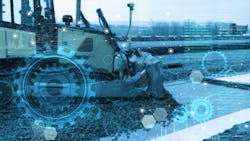What is Digitalization and How Can Fluid Power Benefit?
The term digitalization is often used, but not necessarily easily understood nor how it can be applied in various industries such as fluid power.
In a white paper from the organizers of the International Fluid Power Exposition (IFPE), digitalization is defined as the leveraging of digital technologies to enable or improve a process. Oxford Languages added the term to the Oxford English Dictionary (OED) in 2010 and defines it as the adaptation of a system or process operated using computers and the internet.
However, digitalization should not be confused with the also commonly used term digitization which refers to making analog information digital. The two sort of go hand in hand – once information is digital it can lead the way to enabling digitalization.
Makes sense, right?
If not, that’s okay…there is a lot that goes into achieving digitization and ultimately digitalization. Today, incorporation of sensors and software into fluid power components and systems is enabling the collection and processing of performance data – the digitization aspect.
This information can then be transferred, stored and analyzed through digital technologies such as cloud computing, machine learning (ML), artificial intelligence (AI) and the Internet of Things (IoT). With these tools better insights can be gained into how components and systems actually perform in an application as well as enabling the prediction of maintenance needs. These and other capabilities can lead to improved efficiency and productivity for end customers, ultimately helping them to improve their processes – the digitalization portion.
The concept of digitalization and how it is being applied in the fluid power and general motion control industries is a topic area of focus for Power & Motion in 2023. As such, we are looking to hear from the industry how much knowledge already exists about digitalization, how is it being employed and what education is still necessary.
By taking our survey, you can help provide insight into the topic which we’ll share in the coming months to help our audience better understand this growing trend. You can find the survey here.
Applications in Fluid Power
Implementation of digitalization can be found in many areas within the fluid power industry. Recently, HydraForce announced a partnership with sensor company Tan Delta and telematics company Elevate in which the companies’ technologies are coming together to help improve maintenance of hydraulic systems.
Manifold assemblies equipped with HydraForce cartridge valves will have Tan Delta’s oil conditioning sensor integrated into them for continuous monitoring of oil conditions. Information collected by the sensor will be transferred to the Elevat telematics system where it can be analyzed and sent to machine owners or maintenance personnel when necessary to alert them of potential issues or maintenance needs.
This enables customers to be more proactive with their maintenance schedules so they can reduce unplanned downtime. It can also provide HydraForce with feedback on how its components are performing in the field and provide the potential to use that information for future product developments.
READ MORE about this partnership and how the three companies’ technologies will work together.
In our upcoming webinar, How Fluid Power Can Benefit from Artificial Intelligence, Frank Latino, Product Management Electric Automation at Festo North America, looks at how AI can be implemented in fluid power applications and uses examples from the manufacturing industry to demonstrate the benefits which can be achieved.
A key point Latino made during our discussion for the webinar was that pairing AI with other digital technologies will be key to achieving benefits such as improved maintenance and reducing energy use.
Digitalization is expected to be one of the key themes at IFPE 2023 with various companies showcasing components and systems demonstrating this trend. In the IFPE white paper noted previously, it is stated Casappa intends to show its recently introduced smart piston pump. It consists of a pump, ECU (electronic control unit) and sensors integrated into a single unit to provide enhanced digital control – leading to improved efficiency and overall performance in heavy equipment.
We want to hear from you!
What benefits do you see digitalization providing the fluid power industry? Do you see any challenges associated with implementing digital technologies in fluid power components or systems?
Let us know! Email me at [email protected] or reach out to us on social media.
Twitter: @TechnlgyEditor or @PowerMotionTech
LinkedIn: @PowerMotionTech
About the Author
Sara Jensen
Executive Editor, Power & Motion
Sara Jensen is executive editor of Power & Motion, directing expanded coverage into the modern fluid power space, as well as mechatronic and smart technologies. She has over 15 years of publishing experience. Prior to Power & Motion she spent 11 years with a trade publication for engineers of heavy-duty equipment, the last 3 of which were as the editor and brand lead. Over the course of her time in the B2B industry, Sara has gained an extensive knowledge of various heavy-duty equipment industries — including construction, agriculture, mining and on-road trucks —along with the systems and market trends which impact them such as fluid power and electronic motion control technologies.
You can follow Sara and Power & Motion via the following social media handles:
X (formerly Twitter): @TechnlgyEditor and @PowerMotionTech
LinkedIn: @SaraJensen and @Power&Motion
Facebook: @PowerMotionTech

Leaders relevant to this article:



